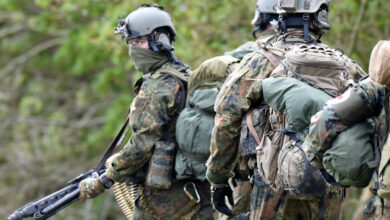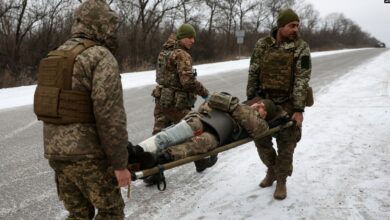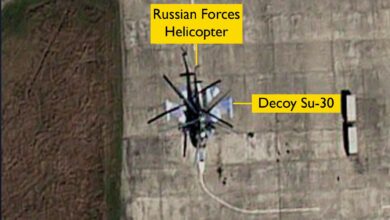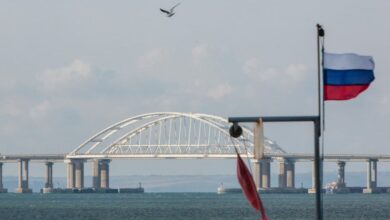
President Joe Biden is belatedly sending 3,000 troops to Eastern Europe in response to the Ukraine crisis. With over 100,000 Russian soldiers massed on Ukraine’s eastern border, Vladimir Putin is probably not quaking in his wingtips — but at least Biden is finally considering some kind of military response after soft power proved ineffective to date.
Of the national sources of power, which include Diplomatic, Information, Military, and Economic (DIME) capabilities, soft power generally refers to the non-military elements.
During the Obama administration, soft power became trendy among the think tanks that have produced many of the current foreign policy officials. Innumerable seminars and workshops were conducted with tons of trees killed for reports.
The concept became less attractive when Donald Trump tried to use non-military means to further his objectives regarding Iran, North Korea, China, and Russia. He even used economic pressure in his semi-successful attempts to force some NATO members to up their fair share of dues to the alliance.

Because nothing Trump did sat well with the foreign policy establishment, soft power became temporarily anathema.
Biden and Soft Power
Under Biden, soft power is again in vogue, but this has come at a cost. Military options have taken a back seat to a point where our opponents no longer fear us and our allies don’t trust Biden’s leadership.
The Biden administration has taken the military option off the table in its dealings with Iran in trying to restart the JCPOA process, and until recently with Russia over Ukraine.
Biden’s attempt to qualify even the use of economic sanctions depending on how much of Ukraine Putin was going to gobble up was met with horror in Kyiv, consternation among our NATO allies, and derision by Republicans.
Military Option as Ultimate Stick
The 1648 Peace of Westphalia that ended the Thirty Years War began modern diplomacy as we know it, and the consideration of DIME has been a part of serious negotiations between nation states ever since. However, in most negotiations, the military option has always been the ultimate stick.
Prussian general and military theorist Carl von Clausewitz’s observation that “war is politics by other means” resulted from his firsthand observation of Napoleon’s strategic approach.
The conventional wisdom that Napoleon created his empire by military conquest alone is incorrect. Much of French hegemonic expansion during that time was accomplished through diplomacy and economic pressure. Napoleon also skillfully used information operations to undermine his opponents’ confidence.
However, the military threat was always present, and it was used when all else failed. In his later years, Napoleon’s over-reliance on military power became his downfall. Perhaps there is a lesson there for Putin.
DIME During the Cuban Missile Crisis
A more historically relevant example is John F. Kennedy’s handling of the 1962 Cuban Missile Crisis. Kennedy relied on diplomacy to resolve the crisis, but he used all DIME elements to achieve his ends.
Kennedy used the media (information operations) by means of aerial photography to make his case to the international community.
JFK was surprised by this aerial photo proving that Soviets had slipped missiles into Cuba, tomorrow morning 1962: pic.twitter.com/yuZpCe0s2h
— Michael Beschloss (@BeschlossDC) October 15, 2015
Considerable economic sanctions were already in place against Cuba, but a total economic blockade remained on the table.
Throughout the crisis, the military option was credible and real. The US Navy surrounded Cuba and massive amphibious capable forces gathered at Key West to be used if needed.
Ukraine Crisis
By not including military options early in the Ukraine crisis, Biden put himself in the position of the allies when Adolf Hitler threatened Poland in 1939.
France and Britain agreed to support Poland, but they had no forces in place to back it up. Hitler knew this, and he felt free to act. Although they declared war on Germany, the allies helplessly watched as Poland was dismembered.
Putin has placed the US and its western allies in a similar position vis-à-vis Ukraine. The Russian president was reportedly even ready to use the same pretext Hitler employed in Poland to start his invasion.
Information leaked by the US reports that Russian agents planned to conduct “false flag” fake attacks on Russian ethnic militias to justify a Russian incursion. In this case, Ukraine does not even have the flimsy guarantees that Poland was given.
Biden is late with the military option. Putin has probably already achieved his objective in initiating the crisis. The weak sisters in NATO, primarily Germany, will likely block any Ukrainian attempt to join the alliance.
The military option should have been on the table when the crisis began in December.
 Gary Anderson was a senior member of the Defense Adaptive Red Team and a Special Advisor to the Deputy Secretary of Defense.
Gary Anderson was a senior member of the Defense Adaptive Red Team and a Special Advisor to the Deputy Secretary of Defense.
He lectures on Red Teaming at the George Washington University’s Elliott School of International Affairs.
The views and opinions expressed here are those of the author and do not necessarily reflect the editorial position of The Defense Post.
The Defense Post aims to publish a wide range of high-quality opinion and analysis from a diverse array of people – do you want to send us yours? Click here to submit an op-ed.










